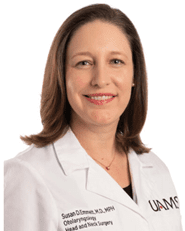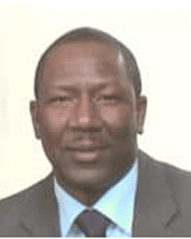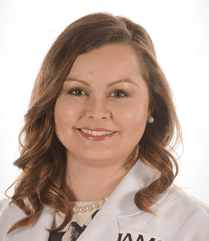
Lindsey Wolf, MD, Assistant Professor, Department of Pediatric Surgery, Arkansas Children’s Hospital
“A pilot program to evaluate feasibility of telemedicine pediatric surgical consultations in referring Emergency Departments”
The long-term goal of this project is to make surgical care accessible for children who need it. Problems that require surgery may come on suddenly or slowly worsen over time. If a child does not receive surgical care, the problem can often become very serious. A challenge in Arkansas is that many areas of the state are rural. The only children’s hospital in the state is located in Little Rock and it can take several hours to reach it from more remote areas. All of the pediatric surgeons in the state are located at the children’s hospital in Little Rock. We propose that telemedicine may be one way to make it easier for a child in a rural area with an urgent problem to see a pediatric surgeon.

Susan Emmett, MD, MPH, Associate Professor of Otolaryngology and Public Health, College of Medicine
“Achieving Hearing Health Equity for Rural Children: Optimization of a Novel Mobile Health Tympanometer for Community-Based Hearing Screening”
Hearing loss in children is concerning because of the lifelong impact on speech and language development, school achievement, and future employment opportunities. There is a disproportionately high burden of hearing loss in underserved rural communities. School screening programs serve as critical access points to hearing care in rural settings, but most programs do not have access to the tools necessary to identify middle ear disease. A tympanometer is an important test for evaluating the health of the middle ear but is often not used because tympanometers are expensive and are designed to be operated by trained audiologists. Adding a commercial tympanometer to the existing school screening program is difficult to complete and requires support from a trained audiologist. To address the barriers of cost and training, we have developed a low-cost, lay friendly mobile health (mHealth) tympanometer and machine learning (ML) algorithm to enable broad implementation in rural settings where the prevalence of infection-related hearing loss is high. Our cutting-edge device is designed to allow users such as teachers and community workers to accurately identify children with preventable, infection-related hearing loss. To successfully commercialize the device for lay users, the prototype mHealth tympanometer must first be validated in this TRI pilot study.

Stanley Ellis, EdD, MS, CFD, CPP, Assistant Professor, Institute for Digital Health and Innovation, College of Medicine
“School-Based Tele-counseling Feasibility Pilot”
This study will look at the feasibility of using telehealth to provide safe, evidence-based mental health services to underserved, disadvantaged students in school districts located in Philips County. Philips county is one of fifteen rural Arkansas counties situated in an area known as the Delta. This region’s economy, built on agriculture, has seen a sharp decline in jobs due to changes in farming technology and other factors. In Philips County, only 9.2 family medicine physicians are available for 10,000 children, a rate lower than 70.6% of all the counties in the state (CDC, 2022). Parents may not have the ability to take off work or the transportation needed to take their children for medical visits. Even when children can receive services, they may be away from the classroom for an extended time. Students enrolled in Philips County school districts have not escaped the mental health crisis that exists within the youth population of the nation. In fact, coupled with the additional barriers and challenges to healthcare, they are in desperate need of access to behavioral health services. The ability to offer behavioral health services to school-age children in Philips County school districts through telehealth breaks down barriers and creates access to this specialty care. Students who may receive these services will gain a stronger support system and the behavioral health services needed to create a brighter future for the student and the community.

Michael R. Thomsen, PhD, Professor, Department of Health Policy and Management, College of Public Health
The best time to prevent severe obesity is during childhood. Data from a national health and nutrition survey indicate that just under five percent of children ages six to eight across the United States were recently estimated to have severe obesity. Severe obesity is sometimes called class II and class III obesity. Children with severe obesity are at significantly elevated risk for adverse health conditions compared to children who have obesity but not severe obesity. Even if children with severe obesity do not develop chronic health conditions during childhood or adolescence, this condition is taxing on a socioemotional level and has been shown to adversely affect quality of life. Children in rural areas are 26 percent more likely to develop obesity. However, there is less understanding of severe obesity among rural children. The work proposed here will provide a better understanding of how severe obesity may be disproportionately impacting rural areas and the policies, systems, and modifiable features of community environments that may be affecting the development of this condition. The first goal is to understand the unique risks of developing severe obesity among children in rural communities and identify those children at greatest risk for developing this condition. The second goal is to focus on the impact of school meal policies on severe obesity among rural elementary schoolchildren. By accomplishing these goals, the project will contribute to a better understanding of what is needed to support actionable community- and school-level interventions to benefit rural children at heightened risk for developing this condition.

Megan Smith, PharmD, BCACP, Assistant Professor, Department of Pharmacy Practice Education & Training Community Pharmacy Research, College of Pharmacy
“Evaluation of the integration of community health workers (CHW) into rural community pharmacies”
Rural communities continue to experience limited healthcare resources and shortages. Community pharmacies are consistently cited as the most accessible and frequently visited healthcare setting, especially for rural populations. Current research affirms that most patients live within 5 miles of a community pharmacy and that patients in rural communities visit their community pharmacist on average over 2 times as much as their primary care physician. This high frequency of contact with patients allows for a strong and trusted relationship extending beyond medication use to knowing about patients’ health behavior and values. Many researchers and public health professionals have been exploring for some time the impacts of community health workers (CHWs) on the health behaviors and outcomes of rural and underserved communities. Linking CHWs and community pharmacists is a new and innovative opportunity to reach the rural population in Arkansas. This TRI pilot project will evaluate the experience in hiring and training a CHW, challenges, and facilitators experienced in embedding the CHW at the pharmacy, and perceptions of whether and how this model could be expanded to other health gaps beyond vaccinations. The overall aims of this TRI pilot project are to determine barriers and facilitators of implementing and sustaining a pharmacy focused CHW model and co-create with pharmacy and community partners a playbook for implementation and sustainment, and a prioritized set of interventions to explore in future research.
